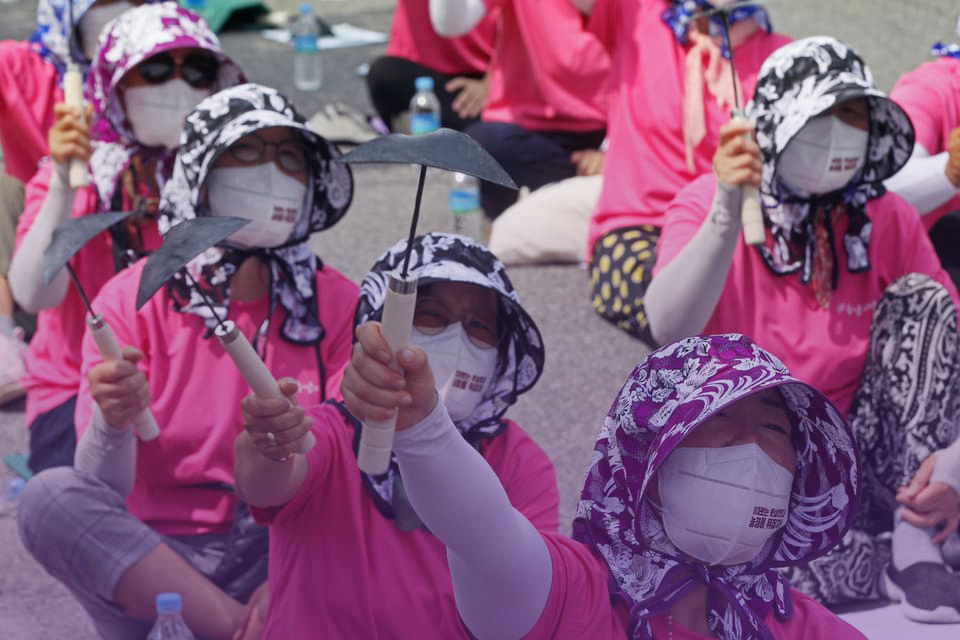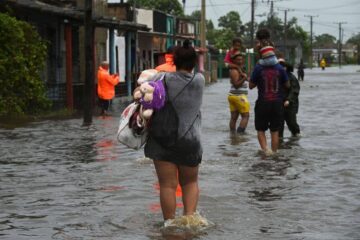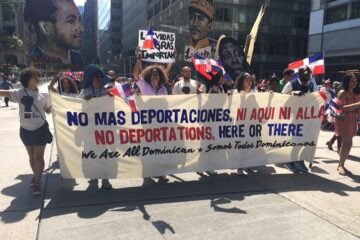September 10th is a day of struggle for La Via Campesina against free trade. This date pays tribute to the militant courage of an extreme political act, when the South Korean activist Lee Kyung Hae took his own life during a demonstration against the World Trade Organization (WTO) in Cancún, Mexico, in 2003. Lee was a peasant who was deeply affected by trade policies, like many other peasants in his country, South Korea. Food imports and the introduction of agriculture in free trade agreements directly impact the lives of peasants, destroying the conditions that support peasant production and livelihoods, while benefiting big transnational corporations in the industry. This is why, on September 10th this year, La Via Campesina denounces: free trade brings debt, poverty, hunger, and death! The organization is calling everyone to continue to struggle against free trade and to build solidarity trade now.
To learn about the analysis peasant women produce on the impacts of free trade and the current challenges posed by this struggle, Capire spoke with Geum-Soon Yoon, a member of the Korean Women Peasants Association (KWPA) and La Via Campesina. Yoon lives in Seongju, South Korea, where she grows melon, vegetables, and beans. Since the 1980s, she has dedicated her life to organizing peasant women and struggling for peace and unification in the Korean Peninsula.
Yoon shares details about the effects of free trade on peasant farming from the perspective of Korean reality, warning about the traps and dangers of a new generation of agreements, especially the investor-state dispute settlements (ISDS). This interview was conducted in Spanish and Korean, and it was only made possible thanks to the interpreting efforts of Jung Eun Lee.
The struggle against free trade has been strategic for social movements, especially La Via Campesina, which has actually built a proposal for food sovereignty to counter the capitalist free trade model for agriculture. May we start this interview by looking back at the reasons why La Via Campesina struggles against free trade agreements and the WTO?
We first became aware of the problems involving free trade agreements (FTAs) when we entered an agreement with Chile in the early 2000s. We knew this would result in many issues for our peasants and farmers, more than any other sector, because, in South Korea’s case, the goal was to increase exports of industrial products. So peasants started to realize the potential problem and immediately knew there was an agreement on the way with the United States, one that would be even more dangerous for the lives and production of Korean peasants.
As of the 2000s and the deal with Chile, the government continued to expand FTAs with other countries. By this point, we have more than 50 free trade agreements, which is a lot compared to other countries. In this context, we are suffering many impacts on our lives and our work. First of all, the prices of agricultural products are not independent, but rather rely on international prices. The prices of agricultural products plummeted, which forced us to change the way we produce. South Korea is a small territory, and it had to expand its scale of production to become more competitive. We have lost seeds and seedbeds. So all inputs and seeds are already in the hands of foreign companies. As we face a situation that has changed so much, we, as peasant women, had to adapt significantly in order to survive. Our food sovereignty is at risk.
Sometimes, peasants have to have two or three jobs to support themselves, which poses a risk to rural life. Many people had to leave the countryside because they were not able to support themselves. As not a lot of people live in rural areas anymore, lately farmland owners have been hiring foreign workers, which creates a different kind of problem in terms of production. In the context of COVID-19, as these farmland owners were not able to bring more foreigners to work for them, they had problems with production, because they depend on them. There are thousands of issues we are facing after all this process.
In South Korea, rural women make up a very small part of the population, because peasant women are leaving. This happens because labor is twice as hard for them—they have to tend to their homes and farms. Not only that, but they also don’t have the right to voice their opinions about domestic and work issues, because of our traditional culture.
What are the impacts of free trade agreements amid the context of COVID-19?
Free trade has had so many impacts on rural areas in the region, and it had already changed the way people produced and lived in the countryside. But after COVID-19, imports went down, as did the influx of foreign labor. So, in a way, market prices remained relatively stable because foreign products were not coming in so massively. Meanwhile, there are few possibilities of sourcing more labor elsewhere. So there has been a huge spike in production prices, because labor prices have doubled. This is part of the problems we have faced this year and last year. We’ve watched the results of a very bad yield due to climate change. Free trade allows free circulation of commodities and hiring foreign workers. This multiplies the demand for and use of fossil fuel energy, ultimately impacting our climate and our environment with greenhouse gas emissions, which affect crops and agricultural production. It’s like a vicious cycle, where one problem leads to another.
Free trade has increased the competition, widened the gap between rich and poor, and expanded urban density, which also helps the coronavirus to spread. This in turn also increases the social disparity in South Korean society, because those who have money and financial means can protect themselves.
And what is the role of the International Monetary Fund (IMF) in this crisis?
The IMF has attached many conditions while providing bailouts to various countries. Among the conditions, the reorganization of the financial supervisory system, policy rate hikes, and opening of financial, capital, and foreign exchange markets in relation to the financial sector are included. The reorganization of the financial supervisory system is the privatization of the financial supervisory body. The reorganized private financial institutions pay the financial supervisory service to the financial supervisory authority in the name of financial supervisory contributions. In this relationship, financial supervisory bodies are gradually losing the nature of public organizations that strictly supervise financial institutions.
International financial capital is interested in purchasing assets in large quantities that have fallen in price amid the crisis. To do this, it is necessary to raise interest rates that lower asset prices and open the market to make it easier for foreign capital to enter various countries. COVID-19 has released a lot of funds, and if interest rates rise, many bankruptcies will come out and asset prices will inevitably plunge.
When the social and economic problems caused by COVID-19 first started to emerge, the IMF recommended that governments should be selective when adopting aid plans. In other words, it’s not a fund for everyone, but one that selects which vulnerable population they will choose to fund. Even though the South Korean government hasn’t done that when they first decided on it, many people wondered why the IMF would make such a recommendation to countries. It’s not good that the IMF has one set of guidelines for all countries, when each country has its own different context and conditions, but they all feel compelled to follow these recommendations. This affects people’s lives in countries where the reality is not the same as that of developed countries, such as the United States or European countries.
Particularly in the case of South Korea, young people who didn’t have resources or jobs were receiving aid from the government, but, out of desperation, they were also incurring debt by investing in bitcoin or stocks. It’s a very complex phenomenon, this strong trend of making financial investments when interest rates were not high. If the United States increases interest rates, the South Korean government will increase rates too, and with higher rates, the youth will continue to be burdened with debt in the next few years. In the context of COVID-19, peasants also had to borrow a lot of money from the government and banks. As interest rates continue to go up, they will be increasingly burdened with debt.
South Korea and other Asian countries have been through a period of economic crisis in 1997. A lot of people have seen their debt run up dramatically, because of currency fluctuations. South Korea particularly has experienced a very strong restructuring period, not only because of the IMF loan, but because it has also implemented neoliberal measures. Society has endured the trauma of debt. Neoliberal policies remain in place in our economy. They suck all our work, effort, and energy. Having experienced this, I am afraid the IMF will take advantage of this current catastrophe to meddle in the policies of different countries and stay there forever.
A recent deal is the Regional Comprehensive Economic Partnership(RCEP), established as a major agreement, even as it does not include the United States and the European Union. Are there differences between the RCEP and agreements with the US and the EU? What other deals are being imposed in Asia and which are the challenges that are posed to social, union, and peasant movements in the region?
The RCEP is an agreement entered into by ten Southeast Asian countries, plus South Korea, China, Japan, Australia, and New Zealand. In November 2012, 16 countries kicked off the negotiations, but it was not until November 2020 that they managed to reach a complete agreement, minus India, which eventually opted out. The RCEP is not an ordinary FTA, because it involves countries with different economic conditions that agreed that they will have gradual and partial business levels. It will not be full-on free trade.
This is the world’s biggest bloc as of now, because it includes 30 percent of the global GDP [Gross Domestic Product]. These countries make up 28.7 percent of global trade and 30 percent of the world population. China has spearheaded this bloc, and this movement was followed by the expansion of Asian development and investment banks, of which China is also a major funder.
While China was leveraging the RCEP, Japan felt threatened about it and pushed for a bloc called Trans-Pacific Partnership (TPP). The United States then took the lead in the negotiations for the TPP due to its influence in the Asian region thanks to its alliance with Japan. This is one of the battles between China and the US in the region. The TPP project started during the Obama administration, but Trump later gave it up for his more nationalist and protectionist approach.
Without the United States, in 2018 Japan followed through with the negotiations and eventually signed the Comprehensive and Progressive Agreement for Trans-Pacific Partnership (CPTPP), which makes no exception—in agriculture, for example, there can be no import taxes. It’s very different from the RCEP, which aims to open countries more gradually, taking into consideration the creation of more jobs and benefits in each country and highlighting how important it is to regulate and control the international trade system. Also, about the CPTPP, a very concerning topic for the Korean people is the so-called “investor-state dispute settlements” [ISDS], which means investors can directly sue states that are part of the same bloc.
On the day the CPTPP was signed, the United States announced what it called the Free and Open Indo-Pacific Strategy. This document encompasses the general strategy of diplomatic and economic relations between the US and Australia with countries in this region of Asia. They talk about protecting the countries from cyber attacks, about regional restrictions for aviation and maritime security, about potential threats from China. Many see that, with the RCEP, China is also showing its power and leadership. This is part of the “soft power” that China has been showing to the world, and it’s different from the ways negotiations have been happening for decades.
While every country suffered with the 2008 crisis, China continued to record impressive growth and it did not become stagnant. The prognosis is that, by 2030, China will become the world’s top economy in industrial production, with advanced technology and military. To hold its number-one position, the United States continues to explore different possibilities to enter into more alliances, while China is doing the same in the region.
In the village where I live, in southeastern South Korea, the United States deployed the Terminal High Altitude Area Defense (THAAD) system to the area in 2017, which can shoot down short- and medium-range missiles, as a way to have control against China. I’m mentioning this to provide an overview about these military moves in the region. Many peasant women have fought and still fight to this day against this decision and this military system.
The strategies of transnational corporations for free trade have become diversified, and we observe that as you talk about Asia’s reality. Meanwhile, the corporate capture of the United Nations has been strongly moving forward, as we could see during the Food Systems Summit. Based on the experience of your region, what are the political bids to stop corporate power and free trade? What is the core of the political action on September 10th?
Twenty years ago, the then South Korean president Roh Moo-hyun said a very meaningful thing: he said power seemed to have fallen into the hands of the market. But I think we need some kind of power that can beat the market. We need power that will not hesitate in face of transnationals. This power has to be organized and it has to be political; it has to have awareness, garner influence, and win over the political realm. To make this happen, alliances are necessary, as well as political education and politicization grounded in people power. The most important thing is that people must not be dependent on transnational corporations. Agroecology, which is something we propose, is an alternative, because by practicing it we can build a different, more autonomous way of living.
For September 10th, La Via Campesina will launch its campaign to put health before profit. We have two more slogans for this campaign, “free trade brings debt, poverty, hunger, and death” and “we need solidarity trade.” The solidarity trade we propose is very important to us.
Finally, we would like to pay tribute to the invaluable comrade Lee Kyung Hae. Could you say a few words in his memory?
What happened in 2003 in Cancún remains as a historical memory of the peasant movement. Our comrade Lee Kyung Hae sacrificed himself with honor. It’s a very sad story for us, but, at the same time, I believe his action, his decision, and his sacrifice have raised a lot of awareness, bravery, and hope for peasant men and women around the world. After this happened, peasants were able to stand up more fiercely to fight against neoliberal policies. Lee Kyung Hae gave us the strength to keep struggling and resisting. What we really want is to announce the end of this fictitious, unsustainable neoliberal system. We want to find an alternative, a world where all beings can live healthier and happier lives. We want a new world, and we will keep fighting as a way to remember our comrade.




